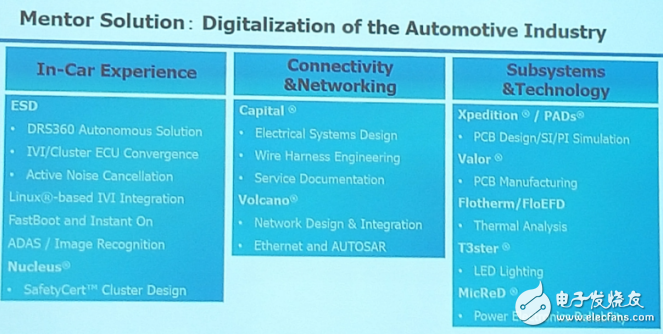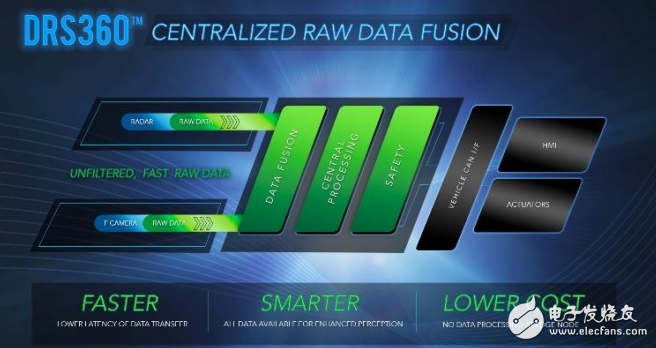Recently, Yao Zhenxin, senior business manager of MentorA Siemens Business, gave a speech entitled “Digital Powered Smart Cars†at the Smart Automotive Electronics Forum held by SEMI. He said that the third round of changes in the automotive industry will be intelligent and digital. In order to meet this challenge, companies need to begin to understand and reserve the digital industry.
Yao Zhenxin said that since Mentor began to get involved in the system field in 2004, the revenue from system customers and the revenue from semiconductor companies have been basically the same, which is the biggest difference between Mentor and other EDA companies.
Cars are typical industries in system applications. After more than 100 years of history, Yao Zhenxin summed up several major changes, the first being the globalization of the 1970s and 1980s, the second round of e-electrification, and the third round. Change will be an intelligent change, and the future will depend on intelligent digital driving.
According to specific data, Yao Zhenxin said that in 2017, each vehicle contains nearly 400 US dollars of semiconductor chips. At the same time, with the increasing use of electronic electronics in the car, it is expected that the cost of electronics in automobiles will account for 50% of the total cost of automobiles in 2030. In addition, the automotive industry requires connectivity from the V2X to a large number of personalized customizations, all of which require new technologies to drive. At the same time, with the rapid development of automotive research and development, the development cycle has been shortened from 24 months to 12 or even 6 months. How to meet the rapid development efficiency, how to put a lot of design verification work into the cloud is also the future development direction.
Three major trends in the development of digital carYao Zhenxin judged that 80% of the innovation and differentiation of automobiles in the future comes from innovation in electronics and electronics and innovation in software. There are three main trends in the future of the automotive industry. The first is the increase in complexity, which needs to meet the needs of new technologies and new functions as well as large-scale customization. The second is the trend of autonomous driving and new energy. The third is the trend of changing business models. New companies will bring new modes such as green travel time-sharing, and all of the above three points need more data to support.
Yao Zhenxin explained in detail that the amount of code in a car is at least one million lines. From traditional motors, wire harnesses, LED lights to radars, cameras, sensors and other components, the system becomes more and more complicated. How to effectively manage, digitally and personally develop, and control how to deliver personalized products on a standard platform is necessary.
In the field of autonomous driving, as autopilot approaches, various reliability verifications are required, including design, functional verification, and final mass production. For new energy sources, as the system voltage in the car changes from tens of volts to hundreds of volts, more security verification is needed. In addition, with the trend of weight reduction, the system's electrical system connection architecture needs to be designed more effectively.
How does Mentor respond?According to Mentor, the digital design of the car is divided into three major areas, the first is research and development, the second is production implementation, and the third is application. In these three aspects, the data is continuous throughout, and can be more Good consistency.
For specific products, Mentor offers three major aspects including in-vehicle products, interconnection and networking, and subsystem solutions.

As shown, Mentor offers a portfolio of products for different applications.
Yao Zhenxin particularly emphasized that the car is a system of systems. All development processes need to be designed into various fields. How to introduce standards and how to realize the whole architecture development requires digital serialization. At present, only E-Mentor can provide a complete set of automotive solutions for EDA manufacturers, greatly reducing the pressure on customers' development.
Yao Zhenxin mentioned that in 2015, Mentor cooperated with SAIC. Through the solution of Mentor, SAIC improved the quality of automobile design and solved the interconnection problem between multiple systems.
Similarly, for US companies, Tesla and Mentor have collaborated to help Tesla shorten the development cycle and digitize the design, manufacturing, after-sales, and maintenance of the supply chain.
In addition, Mentor is also working with BMW to develop a fusion of various sensor data acquisition, analysis and verification based on the autopilot technology developed by DRS360 products.

The DRS360 framework diagram avoids the inherent problems of distributed architecture through centralized processing, with better real-time performance, more efficient data processing, faster decision-making speed, and increased system complexity and power consumption without increasing the number of sensors.
Japan Denso has taken advantage of Mentor's thermal management software to reduce cooling system overhead by 50% over six years.
Delphi also introduced the thermal management of Mentor to improve product quality.
The Toyota Prius is tested and tested with Mentor's high-voltage module IGBTs to ensure the safety and reliability of the body electronics.
Mentor's summary of the digital understanding of carsYao Zhenxin concluded:
First of all, the automotive industry is constantly innovating, and it is necessary to continuously introduce new technologies while conducting effective and rapid research and development.
Digitalization and car networking are huge challenges. The new business model will bring new services and new data, and the industry chain needs to be matched.
As a combination of complex systems, only the correct design can ensure the safe mass production of the whole vehicle. From concept to R&D to final manufacturing application, the whole process needs to be digitized.
Industrial Diesel Generator,Industrial Generators,Commercial Diesel Generators,Industrial Type Diesel Generator
Jiangsu Vantek Power Machinery Co., Ltd , https://www.vantekpower.com